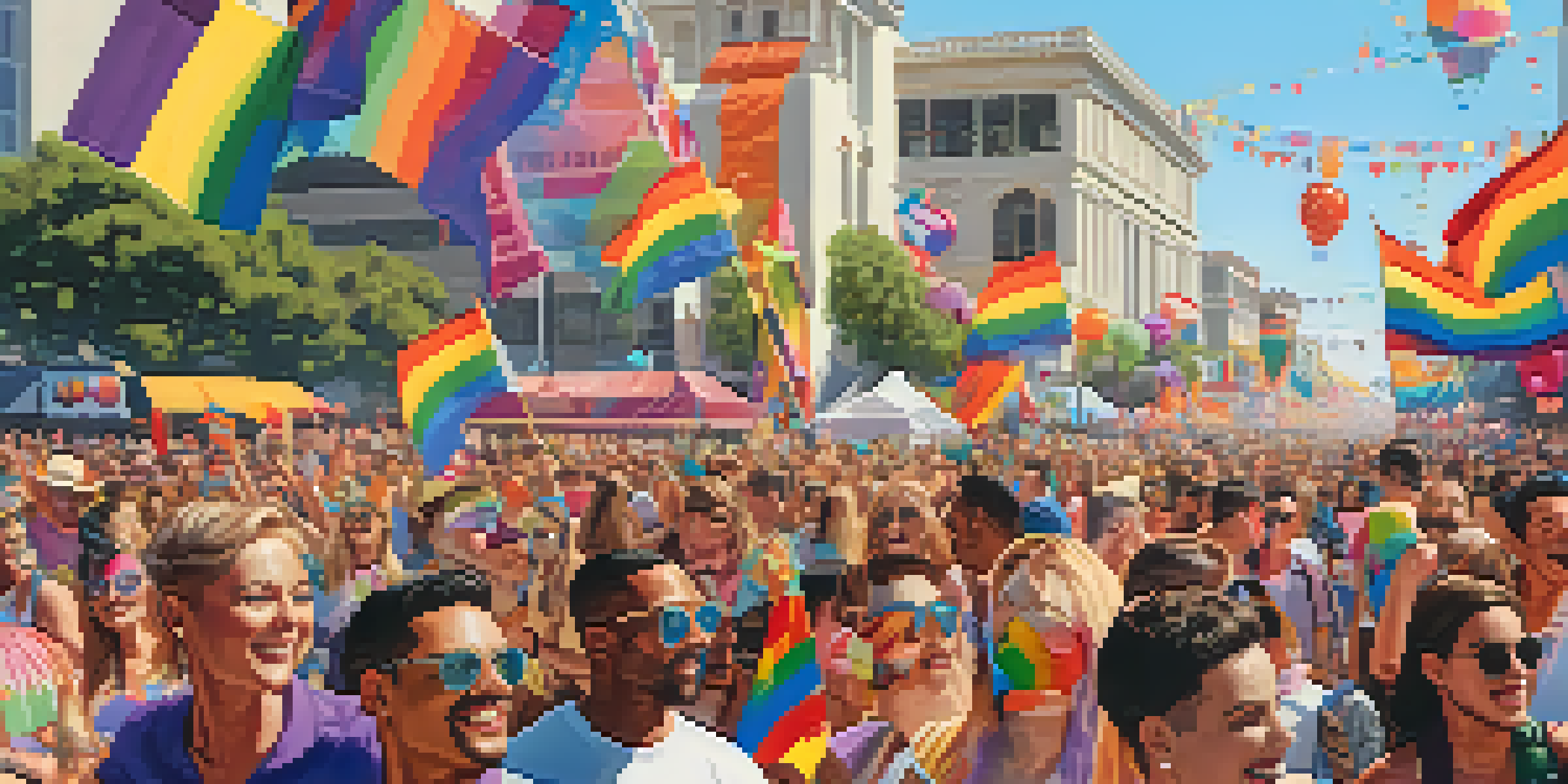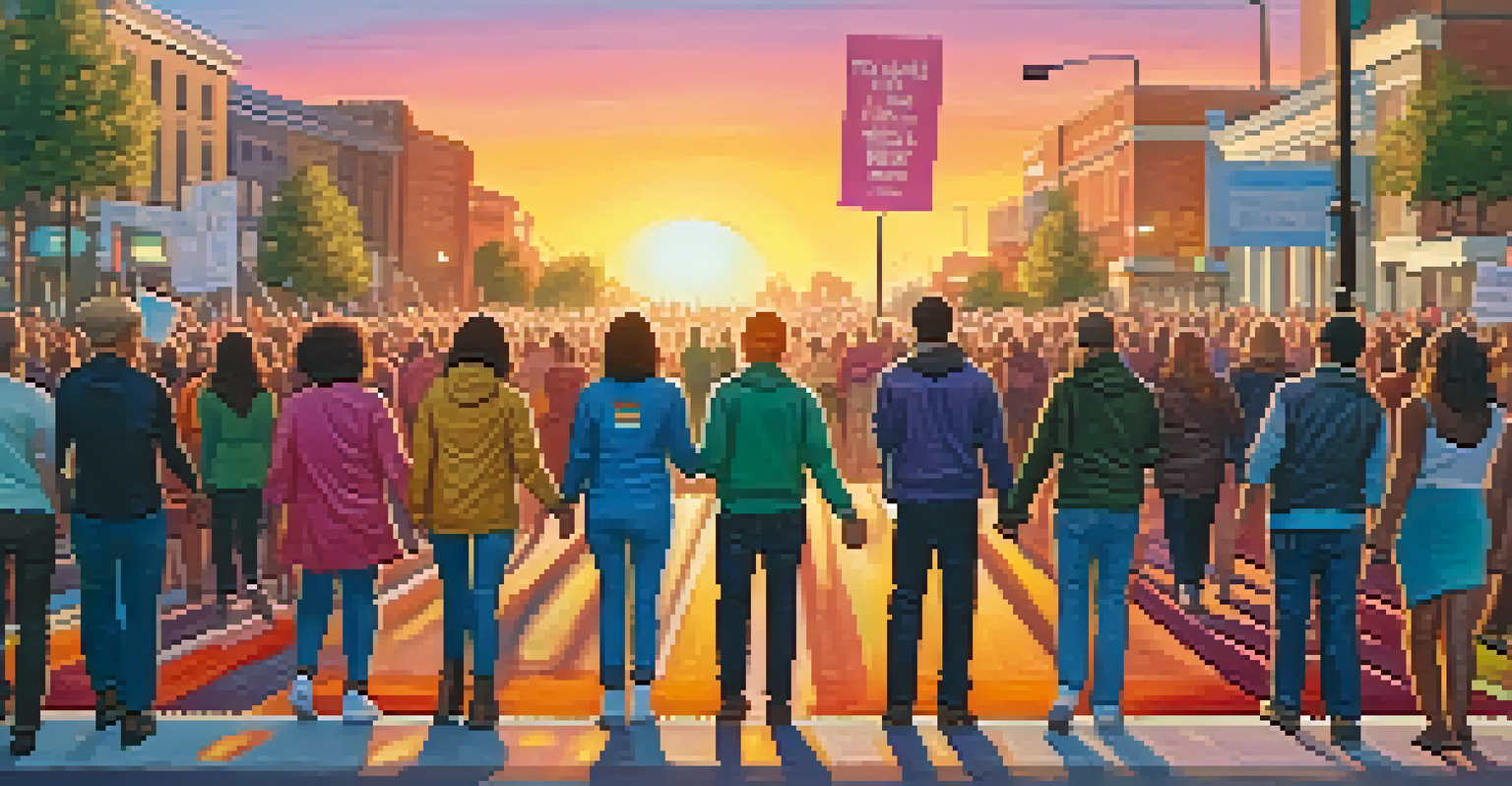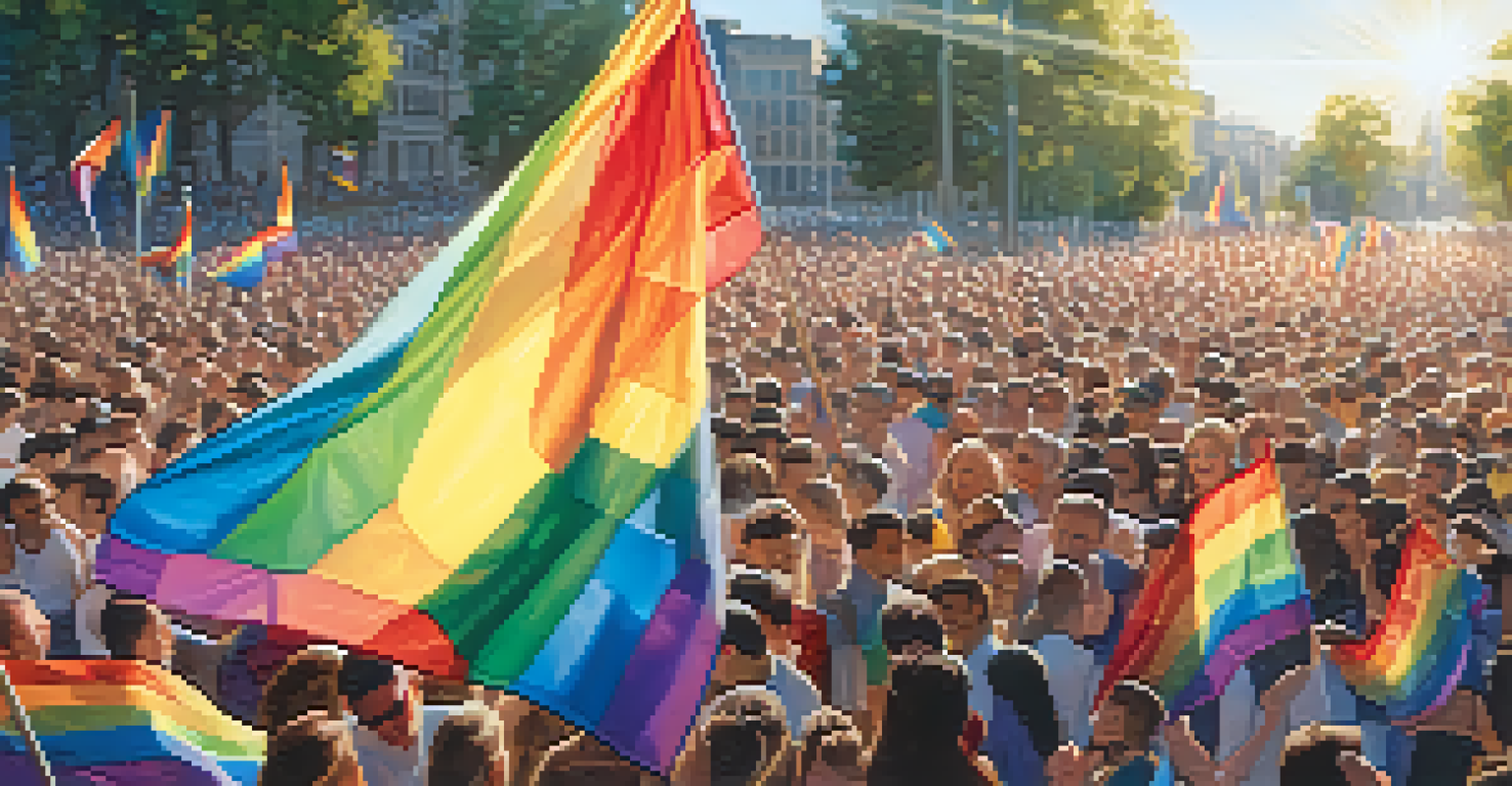The Impact of the Stonewall Riots on LA's LGBTQ+ Community

Understanding the Stonewall Riots and Their Significance
The Stonewall Riots, which took place in June 1969, are often seen as the spark that ignited the modern LGBTQ+ rights movement. This pivotal event occurred at the Stonewall Inn in New York City, where patrons resisted a police raid. Their bravery not only galvanized the local community but also resonated nationwide, becoming a symbol of resistance against oppression.
The Stonewall Riots were the catalyst for the modern LGBTQ+ rights movement, igniting a flame of activism that would spread across the nation.
In the wake of the riots, many cities began to see a surge in activism. The riots inspired individuals across the country, including those in Los Angeles, to confront discrimination and fight for their rights. This momentous occasion marked a turning point, encouraging people to openly embrace their identities and demand equality.
Understanding the context of the Stonewall Riots helps illuminate their profound impact on LGBTQ+ communities everywhere. The collective outrage that followed served as a catalyst for change, leading to the formation of numerous advocacy groups aimed at promoting civil rights and social acceptance.
The Emergence of LGBTQ+ Activism in Los Angeles
In the years following the Stonewall Riots, Los Angeles experienced a surge of LGBTQ+ activism. Organizations such as the Gay Liberation Front and later, the Gay and Lesbian Alliance Against Defamation (GLAAD), emerged in response to the need for solidarity and action. These groups sought to challenge societal norms and advocate for equal rights.

LA's vibrant and diverse community played a crucial role in shaping these movements. The city's unique culture, blending art, music, and activism, provided an ideal backdrop for LGBTQ+ voices to flourish. Events like pride parades became not only celebrations but also powerful demonstrations for rights and recognition.
Stonewall: Catalyst for LGBTQ+ Rights
The Stonewall Riots ignited a nationwide movement for LGBTQ+ rights, inspiring activism and solidarity in communities across the country.
The activism that blossomed in LA was heavily influenced by the spirit of Stonewall. Many activists drew inspiration from the courage shown at the Stonewall Inn, realizing that change was possible through unity and perseverance. This sense of empowerment helped to create a more visible and vocal LGBTQ+ community in the city.
The Role of Media in Shaping LGBTQ+ Narratives
Media played a pivotal role in amplifying the voices of the LGBTQ+ community following the Stonewall Riots. Newspapers, magazines, and later, television began to feature stories about LGBTQ+ lives and struggles, helping to humanize the community. This visibility was essential in challenging stereotypes and promoting understanding.
We’re not just fighting for our rights; we’re fighting for our dignity and humanity.
In Los Angeles, local media outlets began to cover LGBTQ+ events and issues more comprehensively. This shift not only informed the public but also rallied support for the movement. The portrayal of LGBTQ+ individuals in media gradually transformed from negative to more nuanced representations, reflecting the community's diversity and resilience.
Moreover, the rise of LGBTQ+ media, such as Out Magazine and The Advocate, provided a platform for discussion and advocacy. By sharing personal stories and experiences, these publications fostered a sense of belonging and solidarity, encouraging many to engage in activism and support LGBTQ+ rights.
Cultural Shifts and the Rise of LGBTQ+ Visibility
The aftermath of the Stonewall Riots sparked a cultural revolution that significantly impacted Los Angeles. The city became a hub for LGBTQ+ culture, with art, music, and theater reflecting the experiences of the community. From drag shows to LGBTQ+ film festivals, these cultural expressions became vital in promoting acceptance and understanding.
As LGBTQ+ individuals began to embrace their identities more openly, this visibility helped to reshape societal perceptions. The celebration of pride through events like the LA Pride Parade became a powerful statement of resilience and unity. It turned into a platform for activism, raising awareness about issues affecting the LGBTQ+ community.
LA: A Hub for LGBTQ+ Activism
Los Angeles became a focal point for LGBTQ+ activism, with organizations emerging to challenge discrimination and advocate for equal rights.
These cultural shifts also paved the way for future generations. Young LGBTQ+ individuals in Los Angeles today benefit from the groundwork laid by those who stood up during and after Stonewall. The vibrant cultural landscape continues to evolve, fostering an environment where diverse identities are celebrated.
Legal Battles: Fighting for Rights and Recognition
In the years following the Stonewall Riots, legal battles became a central focus for LGBTQ+ activists in Los Angeles. Many activists recognized that legislative change was essential for achieving equality. They worked tirelessly to challenge discriminatory laws and advocate for protections against bias.
Milestone achievements, like the decriminalization of homosexuality in California, marked significant victories for the community. These legal reforms laid the foundation for further advancements, including the fight for marriage equality. The persistence of activists turned the tides, resulting in greater recognition and rights for LGBTQ+ individuals.
Through these struggles, the importance of legal advocacy became clear. The fight for justice was not merely about changing laws but also about affirming the dignity and humanity of LGBTQ+ people. This ongoing journey highlights the interconnectedness of activism, culture, and legal recognition in the quest for equality.
The Impact of HIV/AIDS on the LGBTQ+ Community
The HIV/AIDS crisis of the 1980s had a profound impact on the LGBTQ+ community in Los Angeles. Many activists who emerged from the Stonewall era found themselves grappling with the devastating effects of the epidemic. This led to an urgent need for education, awareness, and support for those affected.
In response to the crisis, organizations like AIDS Project Los Angeles (APLA) were established to provide resources and advocacy. The community rallied together, showcasing incredible resilience and compassion. This period of struggle ultimately strengthened the bonds within the LGBTQ+ community and galvanized efforts for healthcare rights.
Ongoing Struggles for Equality
Despite significant progress since Stonewall, the LGBTQ+ community continues to face challenges, necessitating ongoing advocacy for equality and inclusion.
The legacy of the HIV/AIDS crisis is still felt today, shaping how the community approaches health and advocacy. It serves as a reminder of the importance of solidarity and support in the face of adversity. The lessons learned during this time continue to inspire current and future activism within the LGBTQ+ community.
The Ongoing Fight for Equality and Inclusion
As we reflect on the impact of the Stonewall Riots, it's essential to acknowledge that the fight for LGBTQ+ rights is far from over. While significant progress has been made, many challenges remain in achieving full equality and inclusion. Discrimination, violence, and stigma still affect LGBTQ+ individuals, highlighting the need for continued advocacy.
In Los Angeles, LGBTQ+ activists continue to push for policy changes and social acceptance. Issues such as transgender rights, homelessness, and mental health support remain at the forefront of the movement. The spirit of Stonewall lives on as new generations of activists take up the mantle, inspired by the courage of their predecessors.

The ongoing fight for equality is a collective effort that requires solidarity from all communities. By recognizing the struggles faced by the LGBTQ+ community and advocating for change, we can honor the legacy of Stonewall and work towards a more inclusive society for everyone.